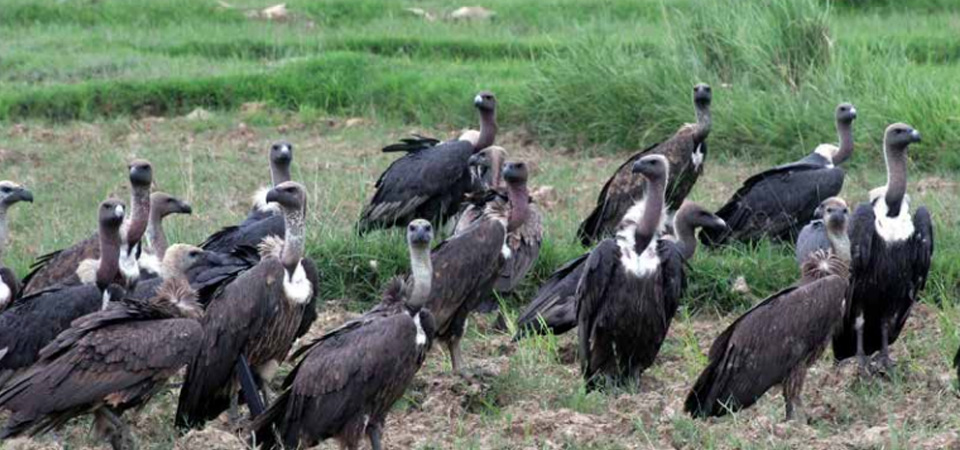‘Tolfenamic acid’ identified as second vulture-safe veterinary drug

By A Staff Reporter
Kathmandu, Sept. 28: Tolfenamic acid, a non-steroidal anti-inflammatory drug (NSAID) used as painkiller in livestock treatment, has been found to be safe to vultures and effective in treating cattle.
A systematic safety testing study done in India led by the Indian Veterinary Research Institute (IVRI) with the Bombay Natural History Society (BNHS) and the Royal Society for the Protection of Birds (RSPB) has identified tolfenamic acid as the second confirmed vulture-safe NSAID after meloxicam.
Meloxicam was tested in 2006 and found to be both safe to vultures and effective in treating cattle, said Chris Bowden, Programme Manager of Saving Asia’s Vulture from Extinction (SAVE).
Vultures, the natural scavengers, play a highly important ecological role through the rapid consumption of animal carcasses. Fairly common birds in the decade of 1990’s are in grave danger of extinction across the Indian subcontinent now.
The cause of these declines has been shown to be the veterinary drug diclofenac which is widely used to treat livestock in Asia, he said.
In 2003, the veterinary use of diclofenac to treat cattle was discovered to be the cause of catastrophic vulture declines across South Asia.
With the aim to save vultures, diclofenac was banned for livestock treatment in Nepal, India and Pakistan in 2006.
There was an urgent need to identify alternative, safe NSAIDs for veterinary use. Unfortunately, various other NSAIDs have also been tested since then and so far all have been shown to be toxic to vultures.
Therefore, it is hugely significant and positive news in the race of saving vultures from extinction, said Krishna Bhusal, IUCN, Vulture Specialist Group Member. In Nepal, there are 14 types of NSAIDs used in livestock treatment and the tolfenamic acid is the third popular drug after meloxicam and nimeuslide, Bhusal said.
After identifying the tolfenamic acid as the vulture-safe drug, we are planning to make people aware and advocate the veterinary practitioners and concerned stakeholders on its massive use, said Ankit Bilash Joshi, Vulture Conservation Programme Manager at Bird Conservation Nepal (BCN).
Dr. Chandra Mohan, Scientist of IVRI and the lead investigator of the study, said, “Every painkiller available has slightly different properties, and the vets often complained of not having a second choice of NSAID. But we are very pleased to report that tolfenamic acid has been found as a second safe NSAID drug.”
Dr. Vibhu Prakash, principal scientist and vulture programme Director of BNHS, explained, “By testing first on the less threatened Himalayan Griffon Vultures, we could establish the comparative safety of the drug. We then also tested it on the most threatened species held at the breeding centre at Pinjore, Haryana.”
Dr. Triveni Dutt, the Director of ICAR-Indian Veterinary Research Institute, commented, “This is a good news for vulture conservation and can help decision-makers to take important steps towards banning the NSAIDs which are proven to be toxic, such as aceclofenac and ketoprofen.”
Tolfenamic acid is already licensed and produced by a number of different Indian manufacturers, being out of patent, and similarly priced to other drugs.
Professor Rhys Green of Cambridge University, UK, and Chair of the SAVE consortium, said, “After sixteen years and considerable effort in safety testing NSAIDs on vultures, we have found a second vulture-safe NSAID for use on cattle. This is important and welcome news. It will reduce the pressure to use toxic alternatives such as aceclofenac, ketoprofen, flunixin and nimesulide, which are still available and legally used in the region. Veterinary use of all these toxic drugs should be banned immediately.”
Recent News

Do not make expressions casting dout on election: EC
14 Apr, 2022
CM Bhatta says may New Year 2079 BS inspire positive thinking
14 Apr, 2022
Three new cases, 44 recoveries in 24 hours
14 Apr, 2022
689 climbers of 84 teams so far acquire permits for climbing various peaks this spring season
14 Apr, 2022
How the rising cost of living crisis is impacting Nepal
14 Apr, 2022
US military confirms an interstellar meteor collided with Earth
14 Apr, 2022
Valneva Covid vaccine approved for use in UK
14 Apr, 2022
Chair Prachanda highlights need of unity among Maoist, Communist forces
14 Apr, 2022
Ranbir Kapoor and Alia Bhatt: Bollywood toasts star couple on wedding
14 Apr, 2022
President Bhandari confers decorations (Photo Feature)
14 Apr, 2022










